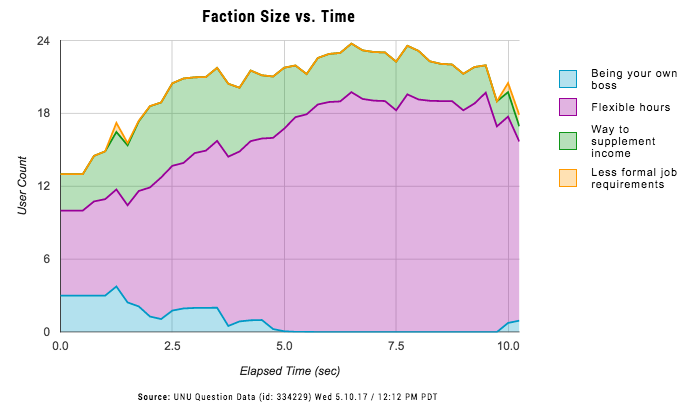Swarm of Gig Workers Weighs in on the Future of Work
Depending on who you ask, the “gig economy” created by companies life Uber, Airbnb and TaskRabbit is either a revolution that’s creating the “future of work” or a “celebration of working yourself to death.” Those polarized opinions can cloud our understanding of the gig economy, making it difficult to gain insight into a powerful economic development that many people, companies, and governments are only beginning to wrap their heads around. Surveys and studies reveal that between 20 and 30% of working age people participate in some form of independent work, yet this collection of data does little to capture deeper insight about what these new forms of employment mean.
To find out, researchers at Unanimous A.I. formed a “super-expert” composed of workers in the gig economy to answer questions using our Swarm AI platform, UNU. Swarming allows groups of people to combine their knowledge, wisdom, insights and intuition to amplify their intelligence and create deep insights. First, our researchers wanted to know what drew workers to these kinds of jobs.

According to the swarm, the flexibility to set your own schedule is seen as the primary benefit of working in the gig economy. And, as you can see in this faction analysis, this result was not particularly controversial. Support for “flexible hours” was strong at the outset of the swarm, and only increased its lead over time.

Yet, our AI super-expert did not see this flexibility as a universal positive. In fact, the swarm reported that the worst thing about working in the gig economy was the constant search for good work. Moreover, the instability of gig work compared a more traditional 9-5 job is seen as the “biggest risk” that these workers face. Gig workers might have the freedom to sleep in if they want to, but our AI reveals that the pressures and uncertainties of their jobs are actually more likely to keep them up at night.
Another major concern raised by the swarm was the lack of benefits available to gig workers. Crucial benefits like retirement funding and health insurance are rarely available to gig workers, leading some analysts to note that “gig workers should plan not to retire,” and suggest that they could become “app-based dog-sitters” in their later years. With these dire prospects in mind, our researchers asked the swarm who should be providing these types of benefits to workers in the gig economy.

The swarm’s response here seems to reinforce the American system of employee-funded healthcare, rather than the government-run systems that we find in many European nations. And, with Uber and Airbnb valued at $69 billion and $31 billion respectively, these companies would seem able to afford a more generous benefits package. Complicating the issue, of course, is the flexibility that draws workers to these platforms in the first place. If you have to work 40 hours / week in order to be eligible for health care or 401K matching, are you really still a member of the gig economy?
One thing is certain, however, from our last question for the swarm. When our researchers asked to identify a fair hourly wage for gig work, the number far exceeded the $15 minimum wage that was such a prominent issue in last year’s presidential campaign. And, in fact the swarm’s response almost perfectly mirrors the estimated $19.53 hour wage earned by Uber drivers nationwide.

Our findings suggest that people who drive for Uber or hang pictures for TaskRabbit enjoy many benefits that would not be available to them at more traditional employers. Flexibility to work as little – or as much – as they’d like, fair wages, increased free-time, and less oversight can all make these jobs perfect for many people. But, our working lives are linked to more than just our day to day tasks, and we can’t say whether or not the tradeoffs are worth it until those same people face a medical bill they can’t afford or want to retire. If companies like Uber and Airbnb truly do represent future of work, they must also define the future of employment.
Every week Unanimous A. I. brings together swarms of regular people just like you to help us predict sporting events, investment opportunities, and technology as well as provide insight into everything from pop culture to politics. If you’d like information on joining a swarm – or just want to stay up to date on the latest predictions – fill out the form below.